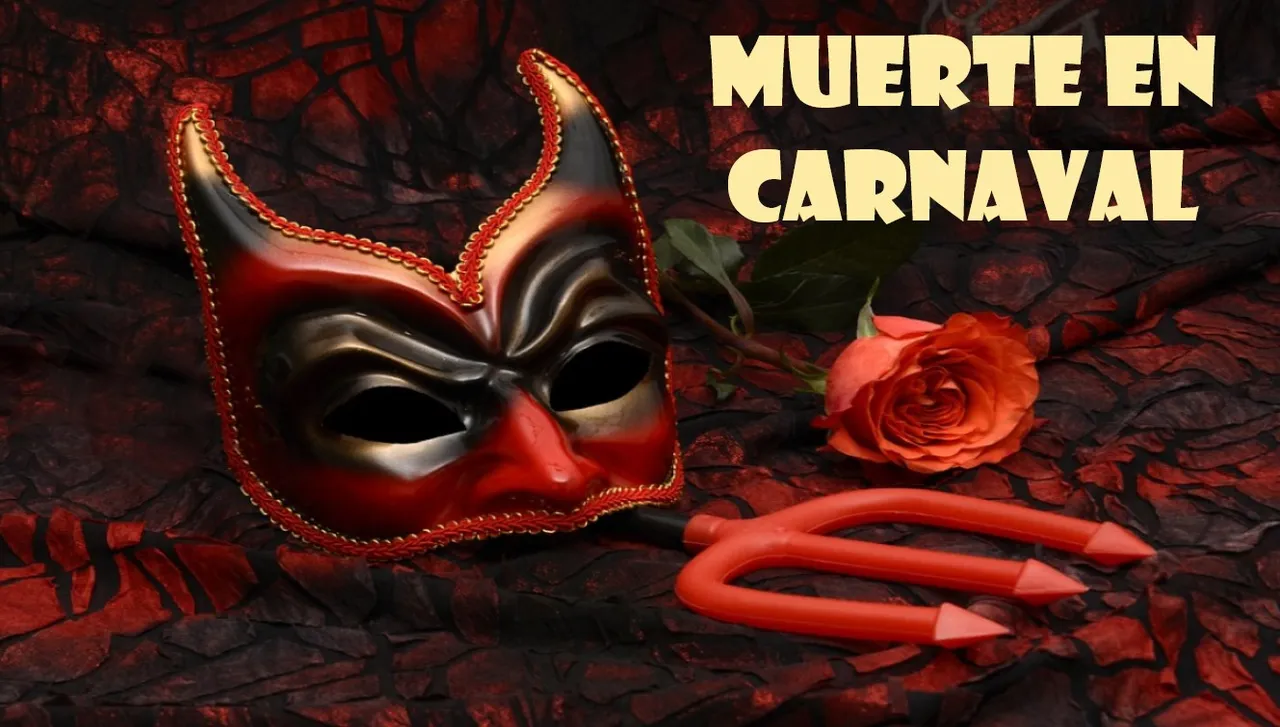

“Pero ni aun así adquirió el difunto un aspecto púdico y decente: era un muerto de carnaval, ni siquiera mostraba sangre de bala o de puñalada corriéndole por el pecho que pudiera rescatarlo de su condición de mascarita.”
Jorge Amado (1912-2001)
Escritor brasileño

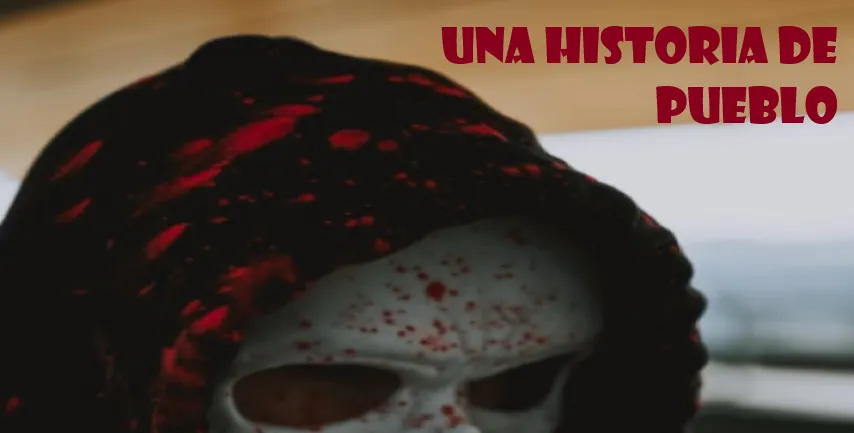
El Hecho...
Braulio, en medio de la gente, una multitud colorida y alegre, bailando y riendo, en la calle principal después del desfile de carnaval; exhaló su último suspiro.
Se desplomó suavemente, atenuada la caída por el profuso ropaje; perdiendo la consciencia, quedando sin sentido, desangrándose feroz y rápidamente con una herida profunda asestada en su vientre.
El color carmesí de la sangre se mimetizaba con la coloración roja intensa de su disfraz de demonio.
Casi todo el pueblo estaba allí, con sus máscaras y disfraces de múltiples colores; y solo los viejos, impedidos o locos, miraban desde las ventanas el ritual desfile y, la eufórica y parlanchina turba.
A su alrededor, las personas ocultas en sus trajes pasaban sin detenerse.
Muchos de ellos le vieron desvanecerse, caer; pero pensaron que estaba borracho.
Más, cuando el río de sangre bajó por la acera y comenzó a tomar un camino sinuoso, dibujando un extraño sendero carmesí en el pavimento, manchando los zapatos de los que pasaban bailando y gritando en medio de la estridente música y la algarabía; alguno que otro curioso comenzó a notar las huellas rojas que iban multiplicando pasos, dejando sellos de recorrido en plena calle, en uno y otro sentido.
Fue entonces cuando notaron que la fuente, era el diablo; Braulio desvanecido en la acera, envuelto en la capa del disfraz, sin sentido, y luego, constatadamente muerto, desangrando.
La algarabía, entonces, fue mayor.
Un grito agudo, femenino, actuó como señal paralizante en todos los que, en ese momento, pasaban o estaban de pie, confundidos, ante el cadáver.
La noche de carnaval se transformaba en sangrienta, en un pueblo donde todos se conocían y donde cualquiera -debemos decirlo- hubiese querido, placenteramente, hacerle ese daño a Braulio.
Tristemente debe confesarse.
I
Pero a Braulio lo mató Pedro, el lingüista; un analista del discurso retirado que le odiaba más que nadie en el mundo.
Ahora bien:
¿Cómo demostrarlo?
Esa fatídica noche, Pedro, quien siempre mostró elegantes ademanes y cuidado discurso; que, con el mismo esmero cuidaba su vestimenta y su lenguaje; se mostró sereno y anímicamente motivado para el disfrute.
Él poseía un gran conocimiento como para disfrazarse destacadamente; y siempre lo hacía con alguna vestimenta que emulaba los célebres carnavales de Venecia.
Sin embargo, esa noche, más temprano, había perdido la máscara y ya no se sentía en ambiente.
A las ocho y media, tal vez antes, había abandonado el desfile, ya llegando a su final, con el objetivo de remediar el desperfecto en el atuendo.
Arrastró literalmente a su mujer sumida en la protesta por dejar el festejo, la algarabía y la calle llena de personas eufóricas, contentas; para regresar a casa; sobre todo, con excesiva y molesta insistencia.
Era de esperar:
Ya antes había llegado tarde a reuniones para cambiarse una corbata que, a la luz de la calle, él pensaba que no le favorecía.
Insistió enérgicamente.
¿Era, acaso, la preparación de una coartada?
¿Dónde había quedado la máscara de Pedro?
II
Por otro lado, Braulio era detestable.
Su problema rallaba en el daño mental.
Poseedor de una dicción, en apariencia, de agradables modales y entonada; era completamente, alucinante e incorrecto en la ideación.
Escuchaba a cualquiera que leyera y tenía una memoria de elefante.
Lo que escuchaba y veía, le quedaba grabado, tatuado en su cerebro; y, luego, hacía profundas y desvirtuadas asociaciones temáticas que, constantemente, cuál ara tropical y leguleya, repetía con gran aire de conocedor, intelectual inminente, en todas partes.
Muchos se reían en su cara; se burlaban, le sacaban el cuerpo. Pero en otros, como en Pedro, producía emociones oscuras e internas que, al oírlo, generaban grandes necesidades fluyentes y poderosas de querer asesinarlo.
III
Braulio sospechaba, que la Divina Comedia -y así lo exponía- había nacido de una sesión espiritista que Dante había tenido; en la cual, una visión del más allá que el de acá, le había permitido disfrutar de todas las maravillas que podían vivirse en el infierno.
Aseguraba, que a Isabel Allende le había sido sembrado el don de la visualización de las verdaderas motivaciones de los seres que habitábamos en América del Sur; un don otorgado por extraterrestres, hermanos mayores, concedido en ceremonias antiquísimas por máquinas visitantes que se posaban sobre pirámides mayas y aztecas.
La obra cinematográfica del popular y gran cineasta estadounidense, Stargate, estaba basada en los miles de signos que estos visitantes dejaron en nuestra tierra, en monumentos hoy tragados por la selva amazónica.
Testificaba, sobre especies de dispositivos electrónicos colocados también en los ancestros mayas, que, al igual que los toltecas, les habían dado la capacidad de comunicarse con seres de otras lunas; de allí sus enseñanzas de vida tan éticamente perfectas.
En filosofía, la cual era un área que bastante dominaba, según decía; explicaba que los estoicos, basaron sus premisas en las enseñanzas de Lucio Estoico, el creador del primer movimiento del pensamiento estoicicísta en Grecia; donde se reunía en interminables tardes de meditaciones y profundas pláticas, con Marco Aurelio, Xenón, Séneca y Epíteto; quienes luego, reformaron con sus principios, esta gran filosofía que dio nacimiento al cristianismo moderno.
De Grecia; y siempre Braulio había insistido en esto; salieron principios doctrinarios tan importantes como la autoevaluación de la conciencia mediante el despeje de grandes fórmulas matemáticas freudianas, que le permitían a la psique entender, cómo Kafka se transformó en cucaracha y desapareció del planeta sin dejar huella, y sin volver a escribir obra literaria alguna, posterior a su último libro, la Guerra y la Paz; un ensayo novelizado de lo que interiormente había vivido Dostoyevski.
A mujeres jóvenes, objeto de su atención masculina: Respetuosa y educada, como él argumentaba; las deslumbraba con largas disertaciones sobre el feminismo legendario que Cleopatra, en Egipto y Pandora, esposa de Epimeteo, hermano de Prometeo, en la antigua Atenas; desencadenaron en el pensamiento moderno para la época, como principios transformados en las artes contra sus respectivos esposos.
Cleopatra, ofendida por el trato desinteresado y nunca prioritario que le daba Marco Antonio; y Pandora, viéndose vejada por infecciones recurrentes que provenían de dudosos regalos en cajas ofrecidos por la familia de Prometeo y su marido.
Ellas crearon los primeros argumentos de acción de la mujer moderna; entre ellos, la opción al suicidio como albedrío humanista diversificado de géneros alternos separados.
Modelo teórico que, luego, Beauvoir y Liz Taylor, simplificaron y organizaron en la era moderna.
IV
Como a las 11 de la noche, cuando agentes de la policía con las linternas de los celulares rastreaban lugares cercanos al cadáver aún expuesto y solo cubierto por la capa roja de Braulio; una máscara gris plata, con tonos rosados en los bordes, fue localizada en un callejón oscuro y olvidado.
Nadie pensó que Pedro pudiese ser culpable, pues no encajaba debido a su elegancia y a sus buenos modales; no, él no podría ser el asesino.
Cuando descubrieron la máscara, sí pensaron en él como el dueño de aquella, prácticamente, obra de arte; más nadie lo relacionó con el fatídico suceso.
Solo yo.
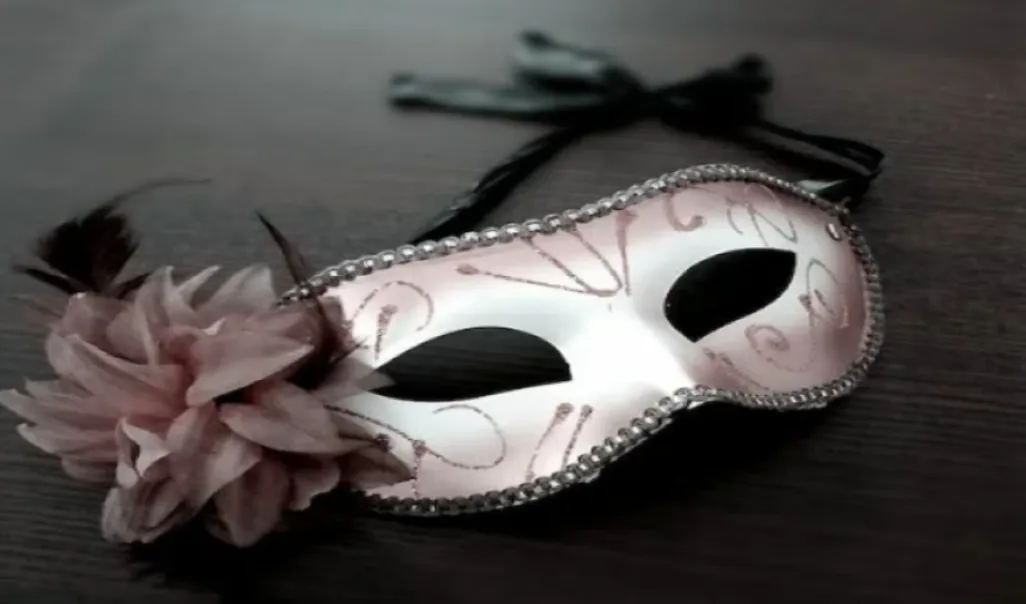
El desenlace
Los lingüistas, analistas del lenguaje; suelen ser fanáticos, detectores de errores y mentiras verbales; sobre todo, aquellos que viven en pueblos tan recónditos como este, que pagarían por asesinar a quien distorsionase el lenguaje o inventase alucinantes historias que desvirtuasen a pensadores respetables o autores inalcanzables para el vulgo.
Así, meses después, cuando las investigaciones dieron con los rastros dejados por el asesino, incluyendo la daga metálica y filosa con las huellas digitales de Pedro; la gente pasmada no paró de hablar por días del retorcido asunto.
La tarde en la que Pedro era lanzado a la parte posterior blindada de una patrulla policial, faltaban solo días para el carnaval siguiente.
Y en ese momento, Pedro, ensimismado y con evidentes señales de locura, musitaba para sí mismo, mientras ladeaba insistentemente su cabeza:
Que, si Don Quijote estaba loco por el viento de la Mancha ¡Según investigaciones recientes hechas por el mismo Almodóvar!
Que si de allí venían, las miles de locuras y distorsiones del lenguaje que escribió y se leen, en la autobiografía de Sancho Panza titulada ¡Don Quijote de la Mancha!
¡Había que matarlo!

Fin

Esta es mi entrada al Carnival Writing Challenge propuesto por @hive-132410 para C/Writing Club
Está inspirado en la significancia social que, en nuestras tierras latinoamericana, tiene esta fecha carnavalesca. En las circunstancias que la gente puede, detrás de una máscara o disfraz, vivir y provocar; a veces insólitas e inimaginables, demenciales, diría yo; en estas fiestas colectivas.
Invito, afectuosamente a @oswaldotorres @cetb2008 e @irvinc a formar parte de este excelente reto, a propósito de la temporada de este año 2023.


Carnival Writing Challenge: Death in Carnival
-A Village Tale-
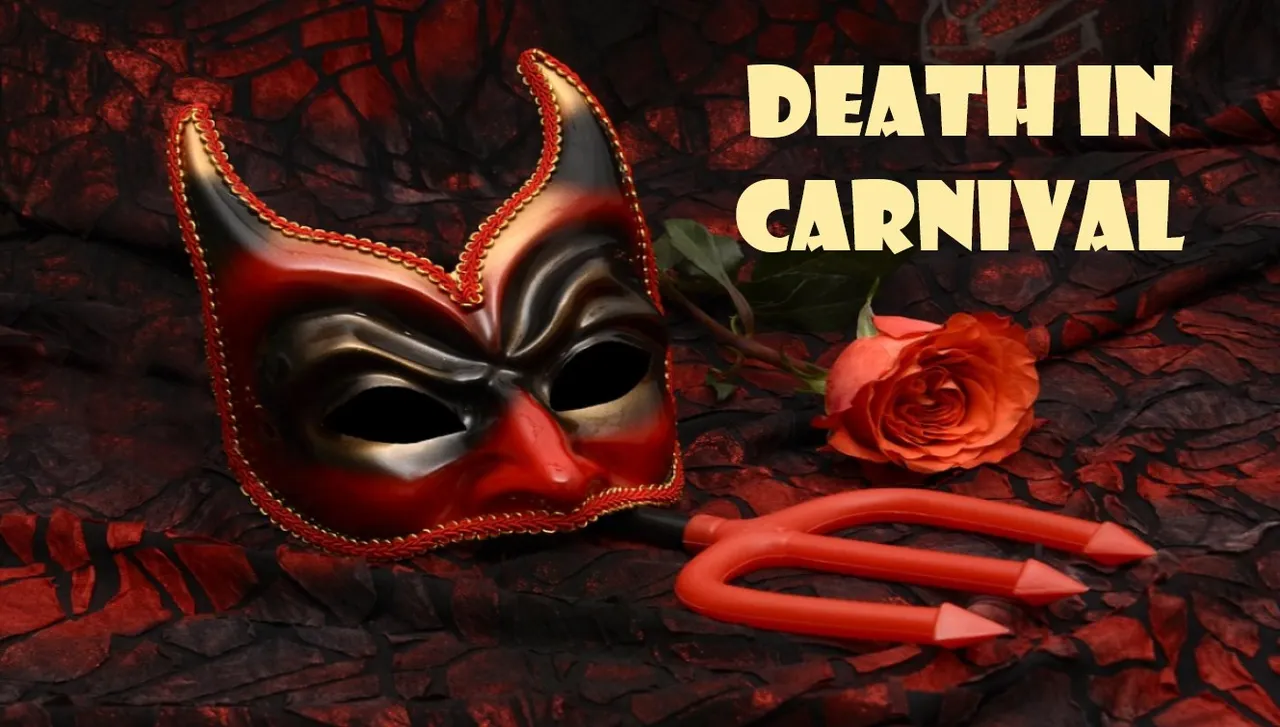

"But even so, the deceased did not acquire a modest and decent appearance: he was a carnival corpse, he did not even show blood from a bullet or a stab wound running down his chest that could rescue him from his condition of a masquerade."
Jorge Amado (1912-2001)
Brazilian writer

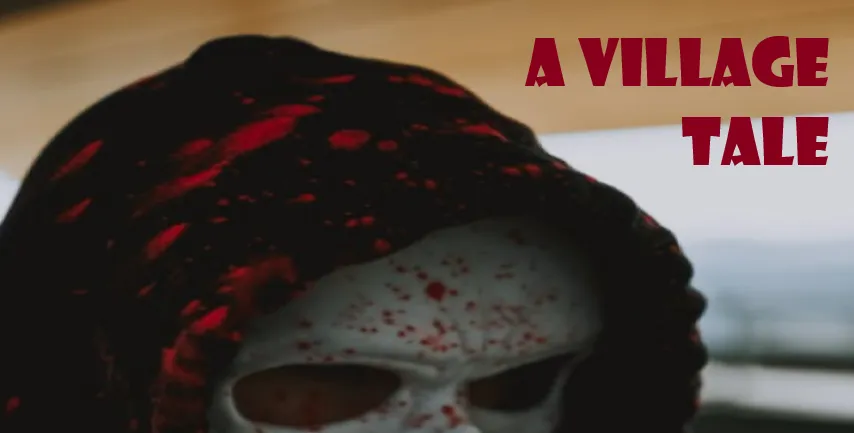
The Fact...
It happened on a Carnival Monday, after 9 o'clock at night. It was still early.
Braulio, in the midst of the people, a colorful and joyful crowd, dancing and laughing, on the main street after the carnival parade, breathed his last breath.
He collapsed softly, his fall attenuated by the profuse clothing; losing consciousness, becoming senseless, bleeding fiercely and rapidly with a deep wound in his belly.
The crimson color of the blood mimicked the deep red coloration of his demon costume.
Almost the whole town was there, with their masks and costumes of multiple colors; and only the old, handicapped or insane, watched from the windows the ritual parade and the euphoric and chattering mob.
All around him, people hidden in their costumes passed without stopping.
Many of them saw him fade, fall; but they thought he was drunk.
But when the river of blood flowed down the sidewalk and began to take a winding path, drawing a strange crimson trail on the pavement, staining the shoes of those who passed dancing and shouting in the midst of the raucous music and the hubbub, some curious people began to notice the red footprints that were multiplying steps, leaving stamps in the middle of the street, in one direction or the other.
It was then when they noticed that the source was the devil; Braulio vanished on the sidewalk, wrapped in the cloak of the disguise, senseless, and then, evidently dead, bleeding to death.
The uproar, then, was greater.
A high-pitched, feminine scream acted as a paralyzing signal to all those who, at that moment, passed by or stood, confused, before the corpse.
The carnival night became bloody, in a town where everyone knew each other and where anyone -we must say it- would have wanted, pleasantly, to do that harm to Braulio.
Sadly, it must be confessed.
I
But Braulio was killed by Pedro, the linguist; a retired speech analyst who hated him more than anyone else in the world.
Now then:
How to prove it?
That fateful night, Pedro, who always showed elegant gestures and careful speech; who, with the same care, took care of his clothes and his language; showed himself serene and animatedly motivated for enjoyment.
He possessed such knowledge as to disguise himself prominently; and he always did so in some costume emulating the celebrated carnivals of Venice.
Earlier that evening, however, he had lost the mask and no longer felt in the mood.
At half past eight, perhaps earlier, he had left the parade, already nearing its end, in order to remedy the flaw in the attire.
He literally dragged his wife, immersed in the protest for leaving the celebration, the hustle and bustle and the street full of euphoric, happy people, to return home; above all, with excessive and annoying insistence.
It was to be expected:
He had been late for meetings before to change a tie that, in the light of the street, he thought did not suit him.
He insisted forcefully.
Was this the preparation of an alibi?
Where had Peter's mask gone?
II
On the other hand, Braulio was detestable.
His problem bordered on mental damage.
Possessing an apparently pleasantly mannered and intoned diction, he was completely hallucinatory and incorrect in ideation.
He listened to anyone who read and had a memory like an elephant.
What he heard and saw, was engraved, tattooed in his brain; and then, he made deep and distorted thematic associations that, constantly, like a tropical and noisy parrot, he repeated with a great air of knowledgeable, imminent intellectual, everywhere.
Many laughed in his face; they made fun of him, they took the body out of him. But in others, as in Pedro, he produced dark and internal emotions that, upon hearing him, generated great flowing and powerful needs to want to assassinate him.
III
Braulio suspected that the Divine Comedy -and so he said- had been born from a spiritualist session that Dante had had; in which, a vision of the beyond the here and now, had allowed him to enjoy all the wonders that could be experienced in hell.
He assured that Isabel Allende had been given the gift of visualization of the true motivations of the beings that inhabited South America; a gift granted by extraterrestrials, older brothers, granted in ancient ceremonies by visiting machines that rested on Mayan and Aztec pyramids.
The film work of the popular and great American filmmaker, Stargate, was based on the thousands of signs that these visitors left on our land, in monuments today swallowed by the Amazon jungle.
It testified, on species of electronic devices also placed on the Mayan ancestors, that, like the Toltecs, they had been given the ability to communicate with beings from other moons; hence their ethically perfect life teachings.
In philosophy, which was an area that he dominated, he explained that the Stoics based their premises on the teachings of Lucius Stoicus, the creator of the first movement of Stoicist thought in Greece, where he met in endless afternoons of meditation and deep talks, with Marcus Aurelius, Xenon, Seneca and Epithetus, who later reformed with their principles, this great philosophy that gave birth to modern Christianity.
From Greece, and Braulio had always insisted on this, came doctrinal principles as important as the self-evaluation of consciousness through the clearing of great Freudian mathematical formulas, which allowed the psyche to understand how Kafka was transformed into a cockroach and disappeared from the planet without leaving a trace, and without writing any literary work after his last book, War and Peace; a novelized essay of what Dostoyevsky had lived inside.
To young women, object of his male attention: Respectful and educated, as he argued; he dazzled them with long dissertations on the legendary feminism that Cleopatra, in Egypt and Pandora, wife of Epimetheus, brother of Prometheus, in ancient Athens; unleashed in modern thought for the time, as principles transformed in the arts against their respective husbands.
Cleopatra, offended by the disinterested and never prioritized treatment given to her by Mark Antony; and Pandora, being vexed by recurrent infections coming from dubious gifts in boxes offered by the family of Prometheus and her husband.
They created the first arguments of action of the modern woman; among them, the option to suicide as a diversified humanist choice of separate alternate genders.
Theoretical model that, later, Beauvoir and Liz Taylor, simplified and organized in the modern era.
IV
At about 11:00 p.m., when police officers with cell phone flashlights were searching nearby places for the corpse still exposed and only covered by Braulio's red cape, a silver-gray mask, with pinkish tones around the edges, was located in a dark and forgotten alley.
No one thought Pedro could be guilty, for he did not fit in because of his elegance and good manners; no, he could not be the murderer.
When they discovered the mask, they did think of him as the owner of that, practically, work of art; but no one linked him to the fateful event.
Only me.

The outcome
Linguists, language analysts, are usually fanatics, detectors of verbal errors and lies; especially those who live in remote villages like this one, who would pay for murdering anyone who distorted the language or invented hallucinating stories that distorted respectable thinkers or authors unattainable to the vulgar.
Thus, months later, when the investigations found the traces left by the murderer, including the sharp metal dagger with Pedro's fingerprints on it, the astonished people did not stop talking about the twisted affair for days.
The afternoon Pedro was thrown into the armored back of a police car, the next carnival was only days away.
And at that moment, Pedro, self-absorbed and with obvious signs of madness, muttered to himself, while insistently tilting his head to one side:
That, if Don Quixote was mad because of the wind of La Mancha, according to recent research done by Almodovar himself!
What if that is where the thousands of madnesses and distortions of language came from, which are written and read in the autobiography of Sancho Panza entitled Don Quixote of La Mancha!
He had to be killed!

The End

This is my entry to the Carnival Writing Challenge proposed by @hive-132410 for C/Writing Club
It is inspired by the social significance that, in our Latin American lands, has this carnival date. In the circumstances that people can, behind a mask or costume, live and provoke; sometimes unusual and unimaginable, insane, I would say; in these collective festivities.
I warmly invite @oswaldotorres @cetb2008 and @irvinc to be part of this excellent challenge, regarding this year's season 2023.

Emilio Ríos – Venezuela
@emiliorios

Reconocimientos / Acknowledgments
- Barras separadoras:
Separator bars
Pixabay-Anncapictures
- Logo de English editado en Paint:
English logo edited in Paint:
Pixabay-10634669
- Imagen de agradecimiento editada en Paint, utilizando con mucho respeto, el logo de la comunidad de C/Writing Club:
Thank you image edited in Paint, respectfully using the C/Writing Club community logo:
Pixabay-Zorro4
- Puedes seguirnos en:
You can follow us on:




